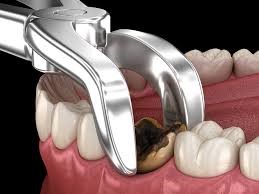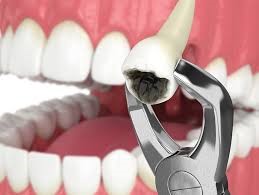Tooth extraction, a common dental procedure, is often the last resort when a tooth is beyond saving due to severe decay, damage, or other complications. While the thought of having a tooth removed can be daunting, understanding the process and what to expect can alleviate much of the anxiety associated with it. Professional tooth extractions performed at dental clinics are safe, efficient, and designed to minimize discomfort and promote quick recovery. Looking for a good, reliable and convenient place to have your tooth extraction, look no further than the Nairobi Sterling Dental Clinic.
Why tooth extraction may be necessary
Tooth extraction is generally recommended when other restorative treatments, such as fillings, crowns, or root canals, are not viable. Some common reasons for tooth extraction include:
- Severe tooth decay – When a tooth is extensively decayed and the damage extends to the pulp (the innermost part of the tooth), an extraction may be necessary to prevent the spread of infection to surrounding teeth and tissues.
- Gum disease – Advanced periodontal disease can cause teeth to become loose as the supporting bone and tissue are destroyed. In some cases, extracting the affected teeth is the best option to preserve oral health.
- Tooth damage – Teeth that are fractured or broken beyond repair, often due to trauma, may need to be extracted, especially if the damage reaches the root.
- Impacted wisdom teeth – Wisdom teeth, or third molars, often don’t have enough space to emerge properly, leading to impaction. Impacted wisdom teeth can cause pain, swelling, infection, and damage to adjacent teeth, making extraction necessary.
- Overcrowding – In cases where the mouth is overcrowded, removing one or more teeth may be necessary to make room for proper alignment, particularly before orthodontic treatment.
- Infection – An infected tooth that does not respond to root canal therapy or antibiotics may need to be extracted to prevent the infection from spreading to other parts of the body.

The tooth extraction procedure
Professional tooth extractions are typically performed by a general dentist or an oral surgeon, depending on the complexity of the case. The procedure is straightforward and can be completed in a single visit. Here’s what to expect during a tooth extraction at a dental clinic:
1. Pre-extraction consultation
Before the extraction, your dentist will conduct a thorough examination of your oral health. This may include X-rays to assess the tooth’s position and the condition of the surrounding bone and tissues. The dentist will discuss the reasons for the extraction, the procedure itself, and any potential risks or complications. If you have any underlying health conditions or are taking medications, it’s important to inform your dentist during this consultation.
2. Anesthesia administration
To ensure your comfort during the extraction, your dentist will administer a local anesthetic to numb the area around the tooth. In cases where multiple teeth are being extracted or if the patient is particularly anxious, sedation or general anesthesia may be offered. The type of anesthesia used will depend on the complexity of the extraction and the patient’s comfort level.
3. The extraction process
There are two main types of tooth extractions: simple and surgical.
- Simple extraction – This procedure is used for teeth that are visible above the gum line and can be easily removed. The dentist will loosen the tooth using an instrument called an elevator and then extract it with forceps. Simple extractions are usually quick and involve minimal discomfort.
- Surgical extraction – Surgical extractions are necessary for teeth that are not fully erupted (such as impacted wisdom teeth) or are broken at the gum line. In these cases, the dentist or oral surgeon may need to make an incision in the gum to access the tooth. In some instances, the tooth may be broken into smaller pieces for easier removal. Surgical extractions are more complex and may require stitches to close the gum tissue afterward.
4. Post-extraction care
After the tooth is removed, the dentist will provide you with detailed aftercare instructions to promote healing and minimize the risk of complications. This typically includes:
- Bite on gauze – You will be asked to bite on a piece of gauze for 30 to 45 minutes after the extraction to help stop the bleeding and form a clot in the tooth socket.
- Pain management – Mild discomfort and swelling are common after an extraction. Over-the-counter pain relievers, such as ibuprofen, can help manage the pain. Your dentist may also prescribe stronger pain medication if necessary.
- Avoid disturbing the clot – It’s important to avoid activities that could dislodge the clot, such as rinsing vigorously, drinking through a straw, or smoking, for at least 24 hours after the extraction. Dislodging the clot can lead to a painful condition known as dry socket, where the bone and nerves are exposed.
- Diet and hydration – Stick to soft foods and avoid hot or spicy foods for the first few days. Drinking plenty of water is essential, but avoid using a straw to prevent dislodging the clot.
- Oral hygiene – Keep your mouth clean by gently brushing your teeth, avoiding the extraction site. After the first 24 hours, you can rinse your mouth with a warm saltwater solution to help reduce swelling and keep the area clean.

When to consider tooth replacement options
After a tooth is extracted, especially if it’s a visible tooth, you may want to consider tooth replacement options to restore your smile and maintain oral function. Common options include:
- Dental implants – A dental implant is a popular and effective way to replace a missing tooth. It involves placing a titanium post into the jawbone, which acts as a replacement root. A crown is then attached to the post, creating a natural-looking and durable tooth replacement.
- Bridges – A dental bridge is a prosthetic device that fills the gap left by the missing tooth. It is anchored to the adjacent teeth or implants and can restore both function and appearance.
- Dentures – For those missing multiple teeth, partial or full dentures can be an affordable option. Dentures are removable prosthetics that replace multiple teeth and are custom-fitted to your mouth.
Cost of tooth extraction
At Nairobi Sterling Dental Clinic, we have ensured that damaged or troublesome teeth don’t pose any danger to your health or comfort. We have put in place an affordable and cost-friendly plan to aid in tooth extractions. At our clinic, we provide quality extractions, that are effective and at extremely hygienic conditions. Our dentists also have years of experience in tooth extraction, hence, provide the best services here. For baby teeth extraction, we charge Ksh.3,500, while regular teeth extraction goes for Ksh.5,000.
To ensure that you don’t lose anything even after tooth extraction, we also provide replacement alternatives for the extracted teeth. These can be in the form of dentures, implants and bridges. These are effective ways to ensure that you regain the structural and functional characteristics of the extracted teeth. Each of these are given at service-specific but affordable costs. Our dentist shall discuss these alternatives with you and provide the necessary guidance around it.
Our Take
Tooth extraction, while often considered a last resort, is sometimes necessary to maintain oral health and prevent further complications. The best professional extractions performed at Nairobi Sterling Dental Clinic. They are safe, efficient, and designed to minimize discomfort. Visit us at our clinic at the Park Suites Building in Parklands for consultations, and let us get the problem off your shoulders. You can also contact us for enquiries or book an appointment with our dentist today.
